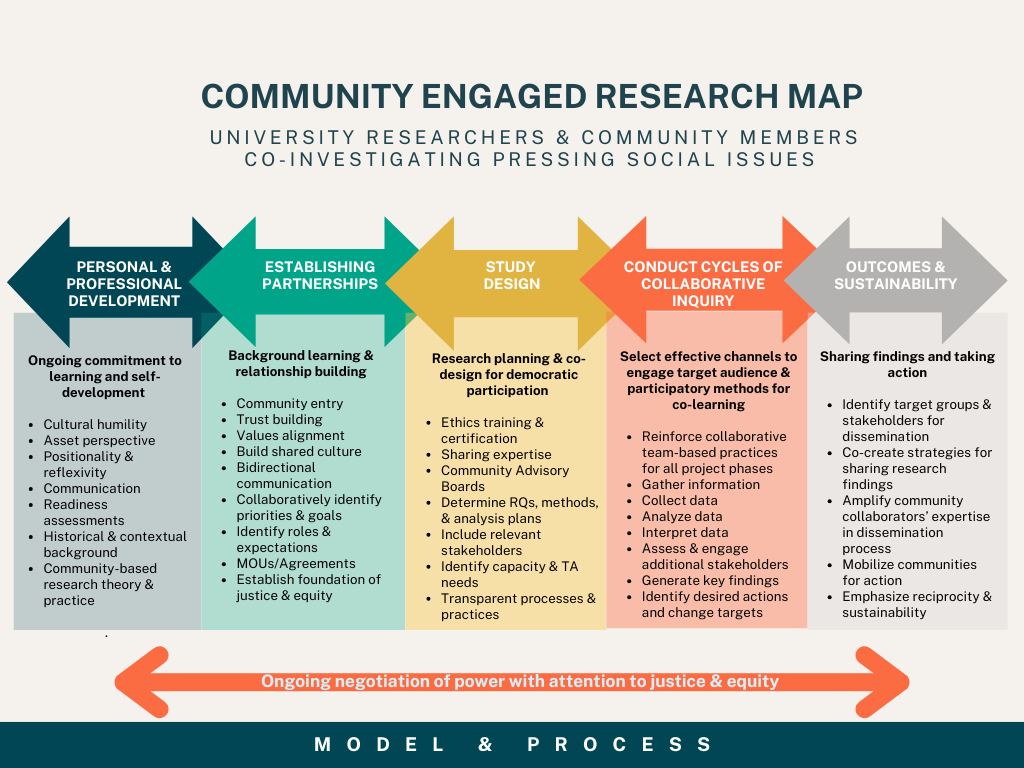Mission
The community-engaged research (CEnR) workgroup is led by an interdisciplinary team of community engaged faculty and researchers who are committed to advancing community health and well-being, equity and justice. Our approach to (CEnR) is guided by a model and set of processes that involves community members and university researchers co-creating and co-investigating pressing social issues (Goessling, K., Witherspoon, D., & Francis, L. (2024). Community engaged research map. SSRI Community Engaged Research Workgroup. Penn State University).

The "Community Engaged Research Map" outlines a model for collaboration between university researchers and community members to co-investigate pressing social issues. It is represented as a sequence of five colored arrows, each symbolizing a phase in the research partnership process. Below these arrows, a horizontal orange arrow labeled “Ongoing negotiation of power with attention to justice & equity” spans the entire process.
Phases and Content:
- Personal & Professional Development: Ongoing commitment to learning and self-development.
- Cultural humility
- Asset perspective
- Positionality and reflexivity
- Communication
- Readiness assessments
- Historical and contextual background
- Community-based research theory & practice
- Establishing Partnerships: Background learning and relationship building.
- Community entry
- Trust building
- Values alignment
- Build shared culture
- Bidirectional communication
- Collaboratively identify priorities and goals
- Identify roles and expectations
- MOUS/agreements
- Establish foundation of justice and equity
- Study Design: Research planning and co-design for democratic participation.
- Ethics training and certification
- Sharing expertise
- Community advisory boards
- Determine RQs, methods, and analysis plans
- Include relevant stakeholders
- Identify capacity and TA needs
- Transparent processes and practices
- Conduct Cycles of Collaborative Inquiry: Select effective channels to engage target audience and participatory methods for co-learning.
- Reinforce collaborative team-based practices for all project phases
- Gather information
- Collect data
- Analyze data
- Interpret data
- Assess and engage additional stakeholders
- Generate key findings
- Identify desired actions and change targets
- Outcomes & Sustainability: Sharing findings and taking action.
- Identify target groups and stakeholders for dissemination
- Co-create strategies for sharing research findings
- Amplify community collaborators' expertise in dissemination process
- Mobilize communities for action
- Emphasize reciprocity and sustainability
Background
Community-university partnerships—also referred to as engaged scholarship—are collaborations between community-based groups and higher education institutions working together to advance equity and justice by co-creating new knowledge, policies, and/or practices that promote individual and social transformation (Bowers 2017; York et al., 2020). Our framework draws upon multidisciplinary approaches to community engaged research, including community based participatory research (Andrews et al., 2012; Israel et al., 2010), research practice partnerships (Ishimaru et al., 2022; Teeters & Jurow, 2018), participatory action research (Fine et al., 2021; Goessling, 2019; 2020), public scholarship (Holland et al., 2003; Learning in Places Collaborative, 2021) and others. Our approach is built on the following key pillars:
- embracing broad definitions of expertise and diverse knowledge systems
- fostering democratic participation through co-creation and co-learning
- prioritizing reciprocal relationships
- maintaining a continuous focus on power dynamics and historical context
- pursuing transformational goals that promote equity and justice
Aims
The CEnR workgroup is focused on increasing the Social Science Research Institute’s capacity to (1) advance community engaged research (CEnR), (2) promote ethical, healthy, and sustainable community-university partnerships, (3) build community engaged research capacity, and (4) disseminate research findings and take action to address pressing social issues that communities identify as priorities, with a focus on equity and justice.
Workgroup Co-Leads
- Lori Francis, Biobehavioral Health
- Kristen Goessling, Penn State Philadelphia Center
- Dawn Witherspoon, Psychology
Steering Committee Members
- Mallika Bose, Landscape Architecture
- Kristina Brant, Rural Sociology
- Sarah Brothers, Sociology and Public Policy
- Jochebed Gayles, Health and Human Development
- Justine Lindemann, Community Development and Resilience
- Raffy Luquis, School of Behavioral Sciences and Education, Penn State Harrisburg
- Mark Ortiz, Geography
- Harrison Pinckney, Recreation, Park and Tourism Management
- Jessica Thompson, Health Policy and Administration
- Niki vonLockette, Public Policy and African American Studies